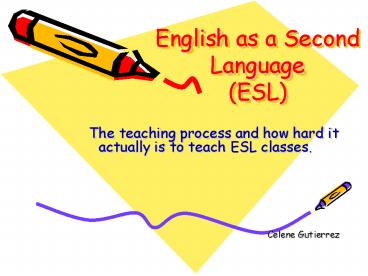English as a Second Language ESL - PowerPoint PPT Presentation
1 / 31
Title:
English as a Second Language ESL
Description:
e) adaptation to the new culture. f) Tools the students need to succeed in other subjects. ... e) help the student adapt to the culture ... – PowerPoint PPT presentation
Number of Views:132
Avg rating:3.0/5.0
Title: English as a Second Language ESL
1
English as a Second Language(ESL)
- The teaching process and how hard it actually
is to teach ESL classes. -
-
-
Celene Gutierrez
2
- It soon became clear that, besides concerning
myself with the issues of my actual teaching I
needed to understand and make decisions about
many other issues that surrounded and permeated
ESL classroom instruction. - -Helene Becker
3
Important Factors
4
a) Background knowledge
5
b)
6
c) Linguistic challenges
7
d) Emotional Challenges
8
e) adaptation to the new culture
9
f) Tools the students need to succeed in other
subjects.
10
- a) background knowledge
- b) culture
- c) emotional challenges
- d) linguistic challenges
- e) help the student adapt to the culture
- f) provide the necessary tools the students need
to succeed in other classes.
11
- LIMITING FACTORS
12
No control over the kindof materials the
government provides them with.
13
Celene What has been your biggest challenge
teaching ESL classes?Ms. Sajor There are not
many resources out there, so you have to
developed your own methods. Basically is a trial
and error process but each year it gets
better.
14
No control over exit exams
15
Adapt
16
Before 2004
17
a) writing skills b) communication skills
18
After 2004
19
good writing skills b) communication
skills
20
How are students placed into ESL classes?
- 101 lt2 years
- 102 2lt yrs lt4
- 103 gt4 years
21
False Beginnersvs. Absolute Beginners
22
- Celene Does your ESL teacher
- speaks English? If yes, is it
- more challenging for you.
- Student 1 (absolute beginner) Yes, because
there are times when I do not know how to ask her
a question and I end up misunderstanding the
material. - Student 2 (false beginner) No, because I
understand everything she says and I also speak
English well enough to ask her any questions.
23
Celene Why do you think some students do not ask
questions when they actually need help? Ms.
Sajor The majority of the students are very shy
and ask little or not questions but those who are
not shy tend to ask me a lot of questions.
24
Miscommunication
25
Communication is a key
26
- a) background knowledge
- b) culture
- c) emotional challenges
- d) linguistic challenges
- e) help the student adapt to the culture
- f) provide the necessary tools the students need
to succeed in other classes.
27
False Beginnersvs. Absolute Beginners
28
Why are ESL classes so different ?
29
Bilingual
30
There are so many factors a teacher must focus on
besides teaching the language.
31
The END































